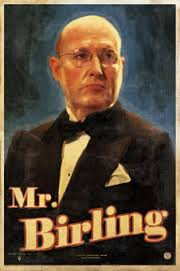Arthur Birling
Image

Question 1
How does Arthur Birling represent the values of Edwardian Britain?
Answer
- He is a dominant male – a patriarch who considers himself superior to women and people less well off than him.
- He is a firm believer in self help (which also makes him quite Victorian in his outlook).
- He is class conscious.
- He opposes change (e.g. he buys port form the same supplier as the Croft family whom he admires).
- He is ‘not the kind of father a chap could go to when he’s in trouble’ (Eric).
Question 2
How does Priestley present Birling in the opening scene?
Answer
- He is dominant; the centre of the family.
- He has old fashioned values (‘there’s a good deal of silly talk about these days’- a reference to the Liberal Welfare Reforms and the growth of the Labour Party and Trade Unionism, something that as a ‘hard headed, practical man of business’, he would be opposed to. (‘there’s a lot of wild talk about possible labour trouble in the near future. Don’t worry. We’ve passed the worse of it’).
- He clearly cares for his daughter and is happy she is marrying a Croft; someone he considers to be socially superior.
- He is a capitalist; interested in money and the acquisition of wealth. (‘We employers at last are coming together to see that our interests – and the interests of Capital – are properly protected’).
- Like many people during this time he is blind to what is happening on the international stage regarding German aggression and the situation in the Balkans (‘And we’re in for a time of steadily increased prosperity’, ‘The Germans don’t want war’).
- He has old fashioned views concerning other cultures (‘…some half-civilized folks in the Balkans’).
- He respects his social superiors and sees sycophancy as a means of acquiring a knighthood (‘Don’t blame her. She comes from an old country family – landed people and so forth – and so it’s only natural. But what I wanted to say is – there’s a fair chance that I might find my way into the next Honours List. Just a knighthood, of course.’).
- He feels the need to assert his status, suggesting an inferiority complex (‘I was Lord Mayor here two years ago when Royalty visited us’).
Question 3
In what way can it be suggested that Birling only sees what he wants to see?
Answer
- He turns a blind eye to his son’s drinking and the lewd activities of Alderman Maggerty.
Question 4
How is he status conscious?
Answer
- He is a self made man, not born into wealth so has an inferiority complex which leads him to frequently assert his power which reinforces his class status (he refuses to give his workers any more money; a living wage).
- He sees the Crofts as socially superior therefore he does not object to Sheila marrying Gerard (‘though Crofts Limited are both older and bigger than Birling and Company’).
- ‘I like a good cigar’ – this is symbolic as the cigar is a symbol of power, business and success.
Question 5
In what way is he a hypocrite?
Answer
- He talks about responsibility but seems to forget his own responsibilities as an employer towards his workers (‘Unless you brighten your ideas, you’ll never be in a position to let anybody stay or tell anybody to go. It’s about time you learnt to take a few responsibilities’).
- He seems to resent anyone who has not worked for their wealth but he shows deference and respect for his ‘social superiors’ and contempt for his workers. (‘That’s something this public-school-and-Varsity life you’ve had doesn’t seem to teach you.)
- He turns a blind eye to Alderman Meggarty sexual liaisons suggesting he thinks there is one rule for people of the upper middle class and another rule for others.
Question 6
What does his reaction to the death of Eva Smith suggest about him?
Answer
- He will not face up to his responsibilities as a human being.
- He will not face up to his responsibilities as an employer.
- He has learned nothing.
- He shows no sorrow or compassion.
- He is arrogant and selfish; his main concern is the shame the affair will bring on his family and prevent his Knighthood.
- His main concern is social preservation.
- Priestley sees him as the moral representation of people of his class and background.
